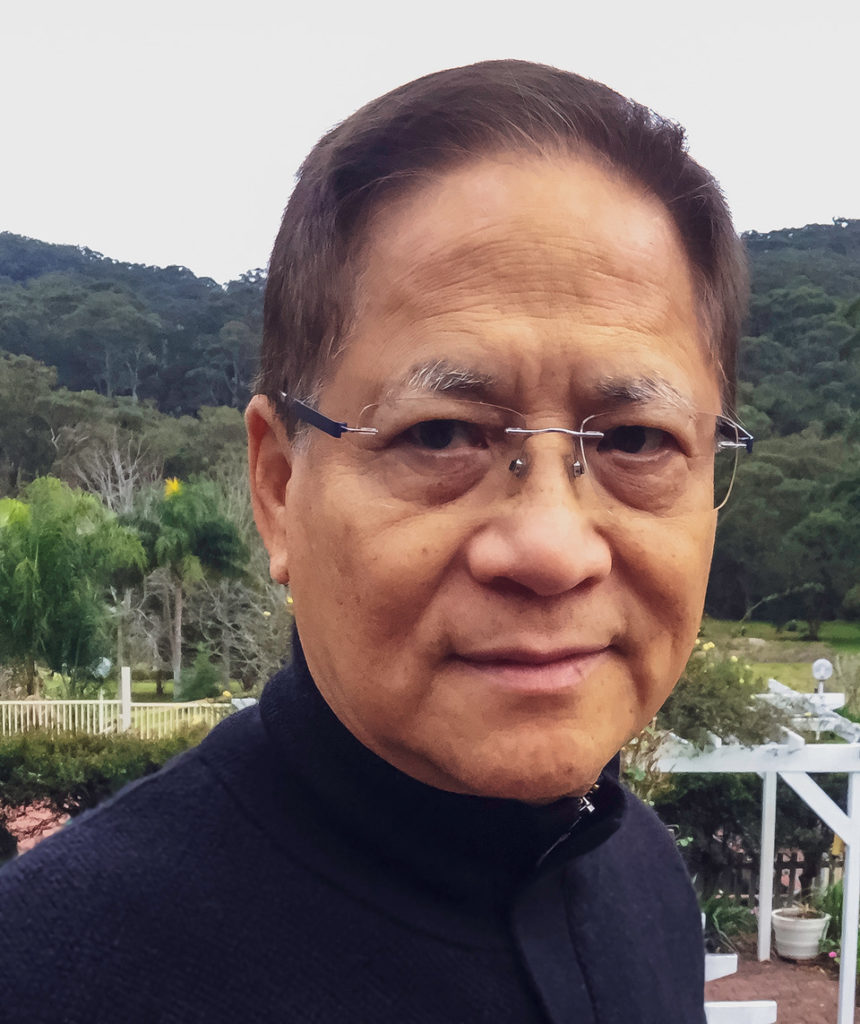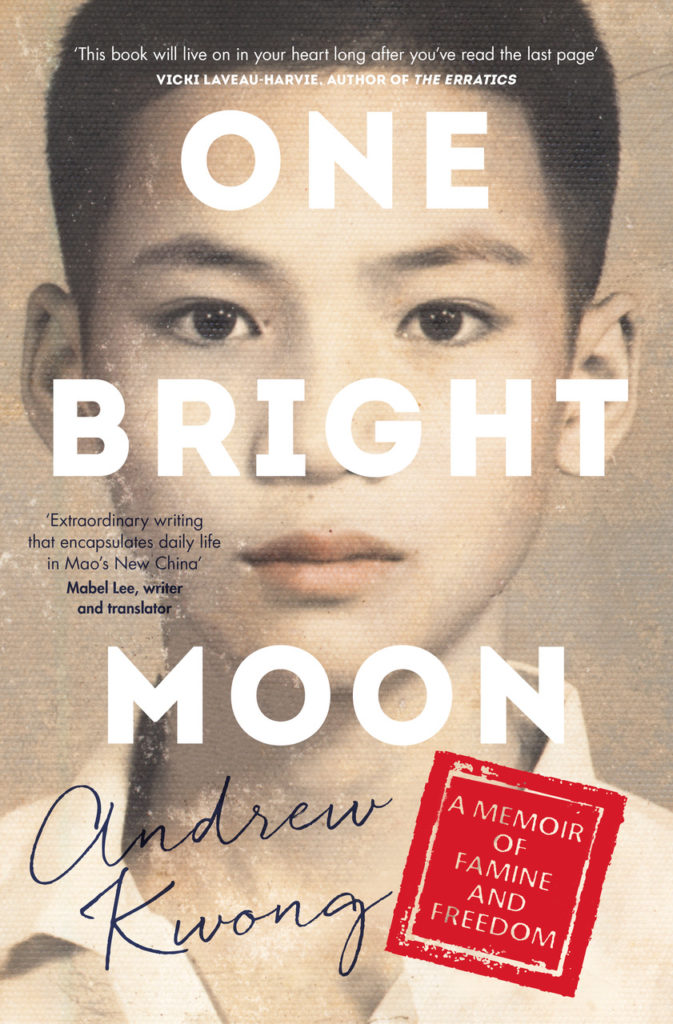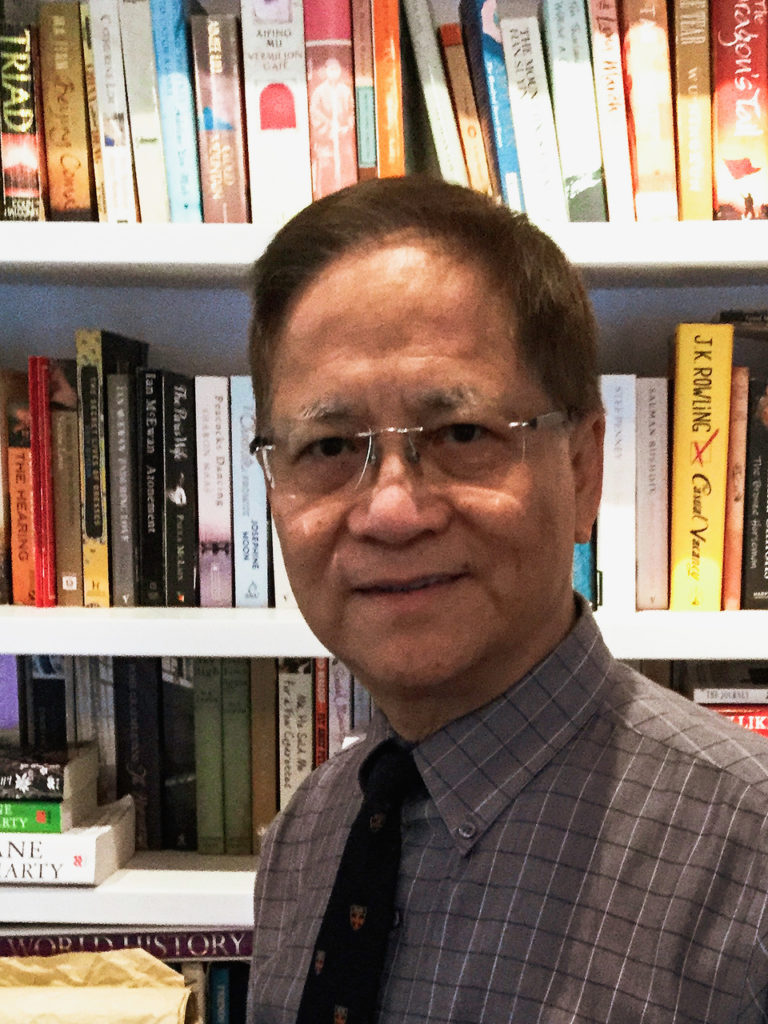Occasionally we shine our spotlight on a member of the Writing NSW community to learn more about their writing journey, achievements, and inspirations.
This month we spoke with Andrew Kwong, autobiographer of One Bright Moon. The manuscript was ‘discovered’ at Writing NSW’s Open House event, under its working title of Snake Business, in November 2018.
Anita Mathews, our Administration and Membership Officer, spoke with Andrew on his writing inspirations and influences, the process of writing One Bright Moon, and his current projects.

Do you remember the exact moment you decided you wanted to be a writer?
Absolutely, I have a habit of making a New Year resolution on the first day of the year: recalling the previous year’s achievements and non-achievements in a way of self-debriefing. I then write down another one for the twelve months ahead.
It was the year 2000 I woke predawn as usual, at my sister’s home in Potomac, Maryland USA during my family’s regular visit to see my ageing mother, sisters and their families. Looking out of the window, in the faint glow of the horizon, the snow-capped undulating paddocks of the distant neighbours scattered in the gentle landscape began to rouse from somnolence. Families of deer were grazing, with the parents guarding the young, assuring their utmost safety from predators. Not a sound outside. The universe was at peace. I knew I had to write about my protracted journey that took me to Australia, far away from our home in Southern China where we had survived not only a bloody revolution with its never-ending persecutions and denigration of the family, but sanctions and embargoes as well, and eventually a devastating famine.
In that instant the many stories I often told my children to keep them entertained on long trips during school holidays sprang forth. I felt an urge to compose them, so that they’d know their forebears’ struggles and their roots. To strive for the better, that’s what humanity is about. This had become the main part of my many New Year resolutions that followed.
How did you get started in writing?
I sat at the desk that very morning in the cosy home, and started recapturing the events that happened to the family, filling half a writing pad before breakfast, and then continued to jot down whatever came to mind, as well as what the family reminisced. I realised on that day it was going to be an emotional challenge as I decided to revisit the journey I travelled on to get to where I wanted. I would like my children – by then young adults – to take possession of the family’s endeavours.
Appreciating that writing is an art that I was not conversant with; I felt the need to learn the skill properly.
After returning to Australia, I immediately enrolled myself in a writing course with the local community college. From there I discovered the Writing NSW (then the NSW Writers’ Centre) where I took many valuable writing courses, and meeting many like-minded and inspiring writers and authors. My eagerness continued to better my skills as a writer. I wrote and re-wrote, edited and re-edited my rough drafts over the ensuing years. Later I heard of Varuna, the National Writers’ House in Katoomba. There I took a paid writing week and met some wonderful writing teachers and writers from all over Australia. I entered its many writing competitions and began to win writing fellowships. Writing has become my major hobby. Meanwhile I continue to participate at the Writing NSW’s stimulating courses whenever possible to keep improving my craft.
What’s the best writing advice you’ve ever been given?
‘Read, read, read; and write, write, write.’ So many great books take many rewrites and re-edits to have them polished to a standard appreciated by readers. To keep writing and rewriting, I usually imagine my draft is an artist’s proof, or a sculptor’s rough stone, that they devote their time tirelessly chipping away, bit by bit, to accomplish their desired final product. So I keep my patience and continue to work on my drafts.
Another great advice I always keep in mind is to write my stories in scenes, one after the other, like in movies, to keep the reader’s attention. And stay in simple English.
What was the hardest part of writing One Bright Moon?
The hardest part of writing One Bright Moon was the emotional agony when recalling the imminent separation from my parents, sisters, family and friends, knowing that it might mean eternity at my tender age of twelve. It was hard to describe the pain in my parents’ hearts letting go their child to the wide, wild world at the time of a relentless revolution and a great famine, with a Cold War at its height. The prospect of survival was slim, let alone making a meaningful life. All we had was hanging onto that tiny spark of hope in the unfathomable horizon, and keeping the love of the family burning inside our hearts. It makes me realise that is what great parents never hesitate to do: to self-sacrifice. I also understand why so many of my compatriots would not exhume their painful past, not even to talk about it. For the pain can be utterly consuming. But the flip side of completing One Bright Moon was that I earned a much deeper understanding of what humanity is about. I wrote away the anger of the unfair world.
What do you hope your readers take away from reading it?
Love, parental devotion, perseverance, focus, tenacity, friendship, empathy for others, and compassion for all. Hang onto hope, and believe in yourself to overcome and achieve. Never give up on your dreams. Writing and reading are liberating therapies for the body and soul. They are the best medicines to keep on our life’s journeys.

What do you love about writing?
I often maintain, with great respect to my devoted wife and family, that medicine is my first love, and writing my mistress, since my mid-life crisis’ resolution in Potomac. Some people think writing is lonely, if not selfish. It may well be. But for me it is not just therapeutic, but one of the most enjoyable art forms that leads us to the understanding of many facets in being human. It reminds us what being civilised means. Civilisation makes us better people, especially in the supersonically fast age we live in, with heart-warming human touches steadily being replaced.
What books or authors have influenced your own writing?
I read everything I can lay my hands on, from newspapers, magazines to books on many genres. I live in good books, and often I re-read them to indulge myself in their worlds or scenes. I admire the art of the many authors from Shakespeare, Elliott to Thomas Keneally, Elizabeth Jolley, Solzhenitsyn, Rushdie, John Steinbeck and others, absorbing their arts in writing, their pains and happiness found. Cervantes was right when he said: ‘There is no book so bad that it does not have something good in it.’ But one has to be a little critical in whatever they read.
One Bright Moon covers a big part of your life. Do you plan to write another book?
Writing One Bright Moon has let me to appreciate not just a better and deeper understanding why people behave in a certain manner under different circumstances, but it has also aroused my long-suppressed ambition to be a good writer. The many favourable reviews and praise of the book also inspire me to keep writing. So I have already embarked on another manuscript on human behaviour in time of existential challenges through the many societal injustices done to the women I have encountered. Its early 2020 draft has won a writing fellowship for 2021 with Varuna. It is going to be quite a challenge for me, but I do sincerely hope it won’t take twenty years to complete, as did One Bright Moon!

One Bright Moon is available from:
Andrew Kwong was born in Zhongshan in the Pearl River Delta in the People’s Republic of China, educated there and also in Hong Kong and Australia. He trained as a doctor at St Vincent’s Medical School of UNSW, was a resident at the Royal Prince Alfred Hospital in Sydney and is now in active general practice on the Central Coast. He has published many short stories and has been the recipient of numerous writing awards and fellowships, including the Varuna Publishers Award in 2014. He was also recently a guest speaker at the Adelaide Festival Writers’ Week in March. Andrew’s first book One Bright Moon was published by Harper Collins in 2020.
